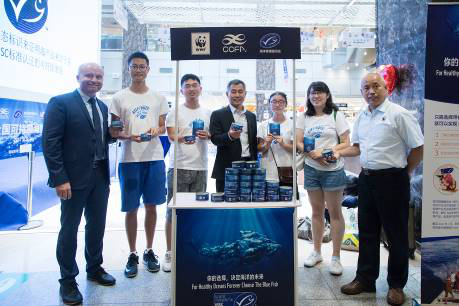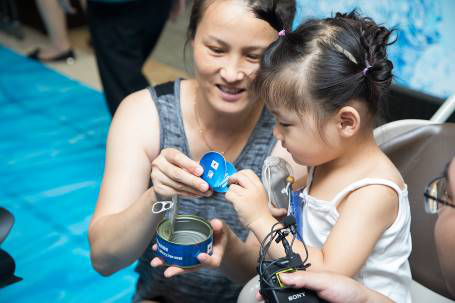Public lecture calls for sustainable seafood consumption
chinagate.cn By Sun Fang,August 22, 2017 Adjust font size:
Ocean for Future public lecture was held at Beijing 77 Theatre on August 18. This event was jointly organized by the World Wildlife Fund (WWF), Marine Stewardship Council (MSC) and the China Chain Store & Franchise Association (CCFA), and more than 150 people from the media, embassies, chambers of commerce, e-commerce platforms, retailers and hotels attended this lecture.
As the last activity of Sustainable Seafood Week, Ocean for Future public lecture aims to appeal the building of a sustainable seafood production and consumption chain that connects marine fisheries, retailers and consumers by presenting and discussing ocean conservation strategies.
Sustainable Seafood Week is a major event of the Sustainable Consumption Week and 144 activities have been organized in 100 retail stores in 30 cities, such as Shanghai, Shenzhen, Beijing, Guangzhou, Chengdu and Shenyang. 2017 Sustainable Consumption Week is jointly organized by CCFA, WWF, MSC and United Nations Environment Programme. Surrounding the theme "Green Consumption, Quality life", various events are held in areas of clothing, eating, living, transportation and entertainment.
David Agnew, Standard Head of MSC, introduced the development and achievements over 20 years of the global sustainable fishery. He said MSC provides a complete set of certification and incentive mechanisms to encourage improvement in sustainable fisheries, so as to protect the ocean and guarantee future seafood supply. Over the past 20 years, MSC has kept up with science and industry to strengthen management and address stakeholder concerns. With the support of many organizations, MSC has become the most widely recognized standard for sustainable fisheries certification. Today, 12 percent of global marine catch is either certified or engaged in the MSC program. MSC aims to increase this figure to 20 percent by 2020 and more than a third by 2030. Fisheries certified by MSC have made many improvements to maintain the fish stock and reduce negative impact on the environment.
Tobai Sadayosi, Member of Leadership Team of Ocean Practice, WWF International and Conservation Director of WWF Japan said the marine vitality index shows a decline of 36 percent between 1970 and 2012 and overfishing is the most common threat attributed to declining fish populations. To protect the ocean and achieve sustainable development in fishery resources, we must improve the governance of fisheries, engage fishers in sustainability with the prospect of maintaining quality produce and encourage retailers to supply sustainable seafood.

On August 4-5, WWF held the event Ocean in the Can in100 retailing stores in30 cities. Consumers opened the can and saw some seawater (salt water) and a card that reads:"For Healthy Oceans Forever Choose the Blue Fish".

A mother explains the words on the card to her daughter.
"As the first fishery in the world to achieve MSC Certification, quota system is the key to sustainable fish," said Mr. Matt Rutter, General Manager of Geraldton Fishermen's Cooperative,"Fishers have two lobster traps on the bottom of the line. While the trap is coming up, some fishermen will throw lobsters back in the water. These are the lobsters that don't meet the required quality standard, the legal size and breeding requirements. Fishermen can confidently decide not to fish today and wait to fish tomorrow when prices are better, because they know lobsters will always be there."
As to the sustainable seafood market in China, An Yan, China Director of MSC, emphasizes that the demand for seafood in China is increasing, so methods should be more standardized to guarantee products can be traced back to their sources. The good news is that more than100 products with blue MSC eco-labels have been introduced to the Chinese market in recent months.
"Sustainable Consumption Week launched by CCFA aims to promote the connection between traceable and sustainable certified products and the market. As one activity of Sustainable Consumption Week, Sustainable Seafood Week encourage retailers to achieve objectives in responsible fishing and introduce seafood with MSC blue eco-labels, which will make it easier for Chinese consumers to recognize and buy sustainable products.” said Wang Wenhua, Director of CCFA.
Shi Quanhua, Executive Program Director, WWF China, said,"Twenty years ago, MSC was established by WWF and other stakeholders. It aims to formulate sustainable fisheries and chain-of-custody standards to guarantee the future supply of aquatic products. Over the years, WWF has always supported MSC's work in China's sustainable aquaculture market. We held the Sustainable Consumption Week with MSC. In the future, we will continue our efforts to tap sustainable aquatic products into the Chinese market.”